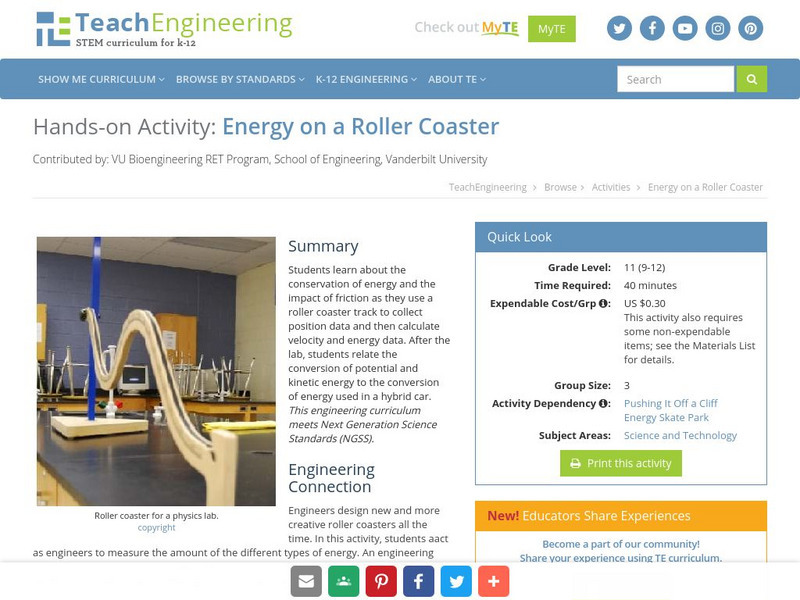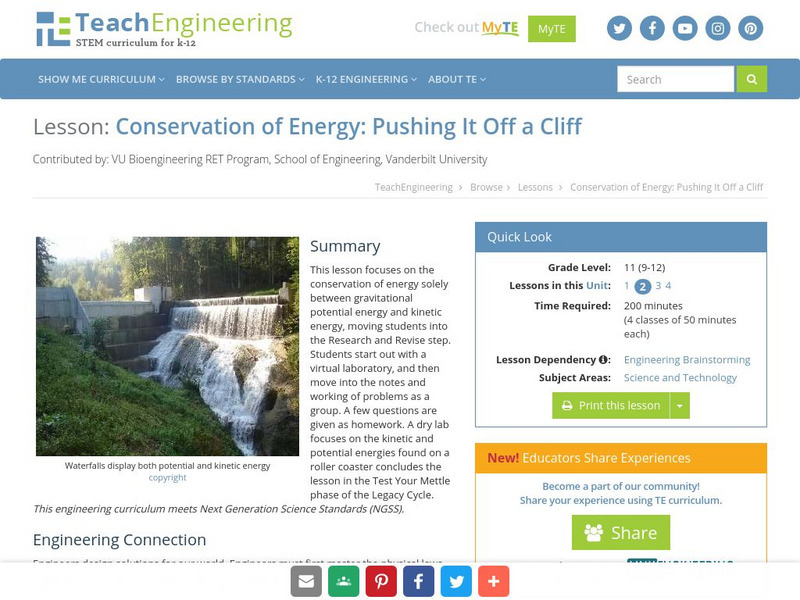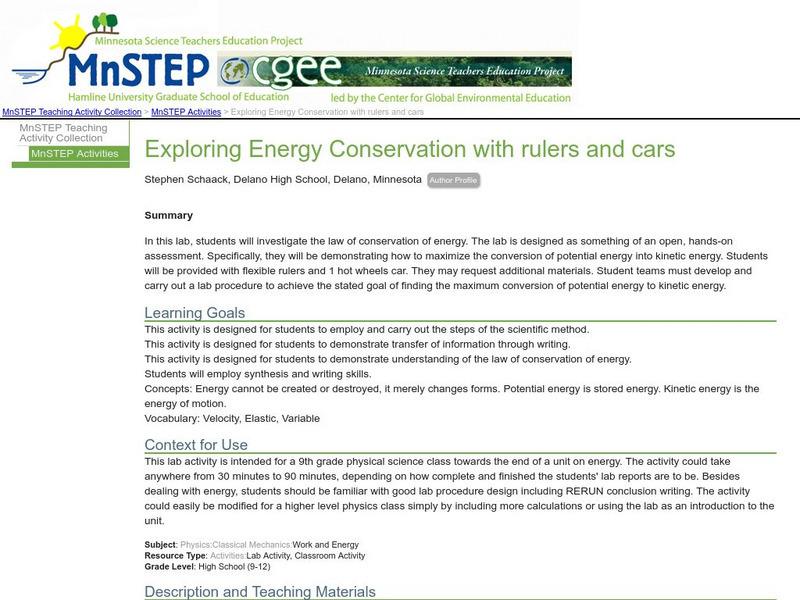Hi, what do you want to do?
Curated OER
Lenz's Law
High schoolers conduct a series of experiments on electromagnetic induction. In this physics lesson, students apply the right hand rule to determine the current direction and electromotive force. They test Lenz's and Faraday's law by...
Virginia Department of Education
Molecular Model Building
During this hands-on activity, young chemists build molecular models based on the Lewis dot structure before studying valence shell electron pair repulsion theory.
Curated OER
Enzymatic Action
High schoolers observe how a cell uses an enzyme to rid itself of a poisonous substance by experimenting with hydrogen peroxide, potatoes, liver and carrots. They record the temperature and changes of the hydrogen peroxide as other...
Curated OER
Stopping Global Climate Change
Students synthesize or express concepts towards solving the question posed at each lab station about climate change. After all lab teams have finished, the teacher facilitates a class discussion on teams' responses to each station.
Curated OER
Luminous Efficacy (Efficiency)
Learners examine the basics of luminous efficacy and why it is used. In this light source lesson plan students test energy efficiency and the luminous efficiency for babies.
Curated OER
Limiting Reagent
Students work in small groups with a small set of 8 nuts and 5 bolts to assemble into combinations of 1 nut: 1 bolt, and 2 nuts: 1 bolt. They explore the outcome and discuss. Then a student mixes two clear, colorless solutions together...
Curated OER
Celt Spoon
Students investigate the invention of a celt spoon. They construct their own in order to make observations. This should include the spinning in opposite directions than that which it is sent. The construction instructions are included in...
Curated OER
Eating a Variety for Breakfast
Students describe different types of breakfasts they would like to eat. They make and eat breakfast food.
Curated OER
Heating the Atmosphere
Pupils construct a thermograph for maximum and minimum temperatures for the 2-week period. They illustrate how the earth's atmosphere is heated by convection and conduction currents and evaporation of water.
Curated OER
Jell-O Optics
Students observe an activity with Jell-O to learn about optics. In this investigative lesson students fill out a handout on the activity that helps them to investigate the index of refraction and the speed of light.
Curated OER
Kernel Power" Ethanol Fuel from Corn
Students study why corn is a biodegradable, renewable resource. In this ethanol instructional activity students build models and observe a chemical reaction.
Curated OER
Synthesizing Pigment and Dyeing Cloth
Students create a synthetic dye and oxidize the dye and record the effects.
Science Education Resource Center at Carleton College
Serc: Two Dimensional Motion and Conservation of Energy
In this physics lab students look at conservation of energy to find the horizontal velocity of a sphere in order to predict where it will land.
TeachEngineering
Teach Engineering: Energy on a Roller Coaster
This activity utilizes hands-on learning with the conservation of energy and the interaction of friction. Students use a roller coaster track and collect position data. The students then calculate velocity, and energy data. After the...
University of Colorado
University of Colorado: Ph Et Interactive Simulations: Pendulum Lab
An interactive simulation that teaches about periodic motion, simple harmonic motion, and conservation of energy. Observe one or two pendulums to determine how the swing is influenced by the length of the string, the mass of the pendulum...
University of Colorado
University of Colorado: Ph Et Interactive Simulations: Masses & Springs
An interactive simulation that teaches about springs, Hooke's Law, and conservation of energy observing changes in kinetic, potential, and thermal energy by adjusting the stiffness and damping of springs holding various masses. This...
Science Education Resource Center at Carleton College
Serc: Adjusting Your Water Heater to Conserve Energy
In this lab-based activity, the students will accomplish two sequential goals. The first goal is to understand the law of conservation of energy.The second goal is to use their knowledge in part one to determine the temperature of a hot...
TeachEngineering
Teach Engineering: It's Tiggerific!
In Lesson 3, as part of the Research and Revise step, students investigate potential energy held within springs (elastic potential energy). Class begins with a video of either spring shoes or bungee jumping. Students then move on into...
TeachEngineering
Teach Engineering: Pushing It Off a Cliff
Lesson 2 moves into the Research and Revise step and focuses on the conservation of energy solely between gravitational potential energy and kinetic energy. Students start out with a virtual laboratory, and then move into the notes and...
University of Colorado
University of Colorado: Ph Et Interactive Simulations: Masses & Springs
Hang various mass weights on spring scales while you adjust the spring stiffness and damping in this online activity. Slow down the action, take it to another planet, or watch the amount of potential, thermal, and kinetic energy.
Science Education Resource Center at Carleton College
Serc: Exploring Energy Conservation With Rulers and Cars
In this lab, students will investigate the law of conservation of energy. The lab is designed as something of an open, hands-on assessment where students demonstrate how to maximize the conversion of potential energy into kinetic energy.
University of Colorado
University of Colorado: Ph Et Interactive Simulations: Masses and Springs
Use this interactive, animated lab to explore conservation of mechanical energy.
Alabama Learning Exchange
Alex: Energy and Work Amusement Park Style
This is a lesson plan presenting energy and work. It covers: types of energy, forms of energy, work, law of conservation of energy, and renewable and nonrenewable energy sources. In the activities section, one will find links to Internet...
Physics Aviary
Physics Aviary: Guided Energy Loss Lab
This guided lab is designed to have students investigate the amount of energy lost by a ball when it bounces. This guided activity is meant to be used as a pre-lab for students who will do this lab live. Students will get a certificate...




























